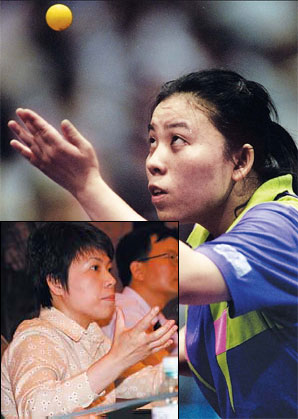Deng Yaping is the new face of "ping-pong diplomacy". The former table tennis champion has become a sporting ambassador for China and is deputy director of the Olympic Village's organizing committee.
They are roles the winner of four Olympic gold medals has taken on with her customary determination, courting the world's press, readying the Village for August and finding time to console victims of the savage earthquake in Sichuan.
At the same time the 35-year-old is a member of the National Committee of the Chinese People's Political Consultative Conference, has just completed her PhD at Cambridge University in England and is raising a child.

Deng Yaping on her way to gold in the women's singles at the 1996 Atlanta Olympic Games.(Inset) Deng speaks at a news conference last week.
It's all in a day's work for Deng, who wasn't even born when the phrase ping-pong diplomacy was minted in 1971, representing rapprochement with the West through exhibition table tennis matches with the United States.
Now, China is opening its doors to the world at the Beijing Games and Deng calls it the "realization of a 100-year-old dream".
Speaking at a press conference last week she said one of the first mentions of the modern Games in China was by a newspaper in Tianjin, 1908, which posed three questions: First, when would Chinese athletes take part? Second, when would a Chinese team take part? Finally, when would China host the Games?
Deng believes China has come of age by hosting the Olympics and said the ramifications would be widespread and significant.
"Through the Olympics we can improve society," Deng said. "According to the International Olympic Committee (IOC) evaluation there will be an Olympic legacy. (One of these effects) is we can increase understanding and friendship. Western countries will learn about our culture and history."
Asked whether the Olympics would benefit everyone in China, Deng responded with a story about her role as a delegate representing athletes in Moscow, when bidding for the right to hold the Games.
"It was in 2001 and I went shopping. A counter clerk asked me to work hard for the bid and I asked her why she was so concerned. She replied that if the bid was successful she could get a new home."
Deng has earned success the hard way. She started playing table tennis at five, initially coached by her father in Zhengzhou, Henan province, and won her first provincial junior championship at nine, becoming national champion at 13.
Even so, she was denied a place on the national team because she was considered too small (1.5 m). She cried all night after she was told and then did something about it by joining a club and training even harder.
Eventually, the table tennis mandarins could not deny her and she was included on the national team in 1988, winning the world singles championship a year later. Overall, she would win more titles than any other table tennis player and was voted Chinese athlete of the 20th Century.
Then, she retired at 24, hampered by niggling injuries and ready to move on to the next stage of her career in sports and diplomacy, joining the IOC's ethics and athletes commissions.
Her belief in the power of sports was evident when she commented during her recent trip to the Sichuan earthquake zone that a background in athletics prepares children for life.
"Our training and example of overcoming difficulties sets a good example for them (kids affected by the quake) to overcome their difficulties. Sport is not only good for the body but also for the mind and confidence."
Deng told journalists she stayed in the quake area for three days, along with other Olympic champions and psychology experts. She called it "consolation work" and said it was a long-term project.
"When the children were not in control of themselves or unable to respond because they were seriously injured, then it was not easy. All we could do was comfort them, help them cry, touch their bodies and feel their warmth."
"Athletes train for many years and need the encouragement of spectators, as we encourage those who need our help."
"We learned that those who lost their friends and families must help each other out with this kind of team spirit. It's like the Olympic spirit," Deng, ever the diplomat, said.
(China Daily June 20, 2008)